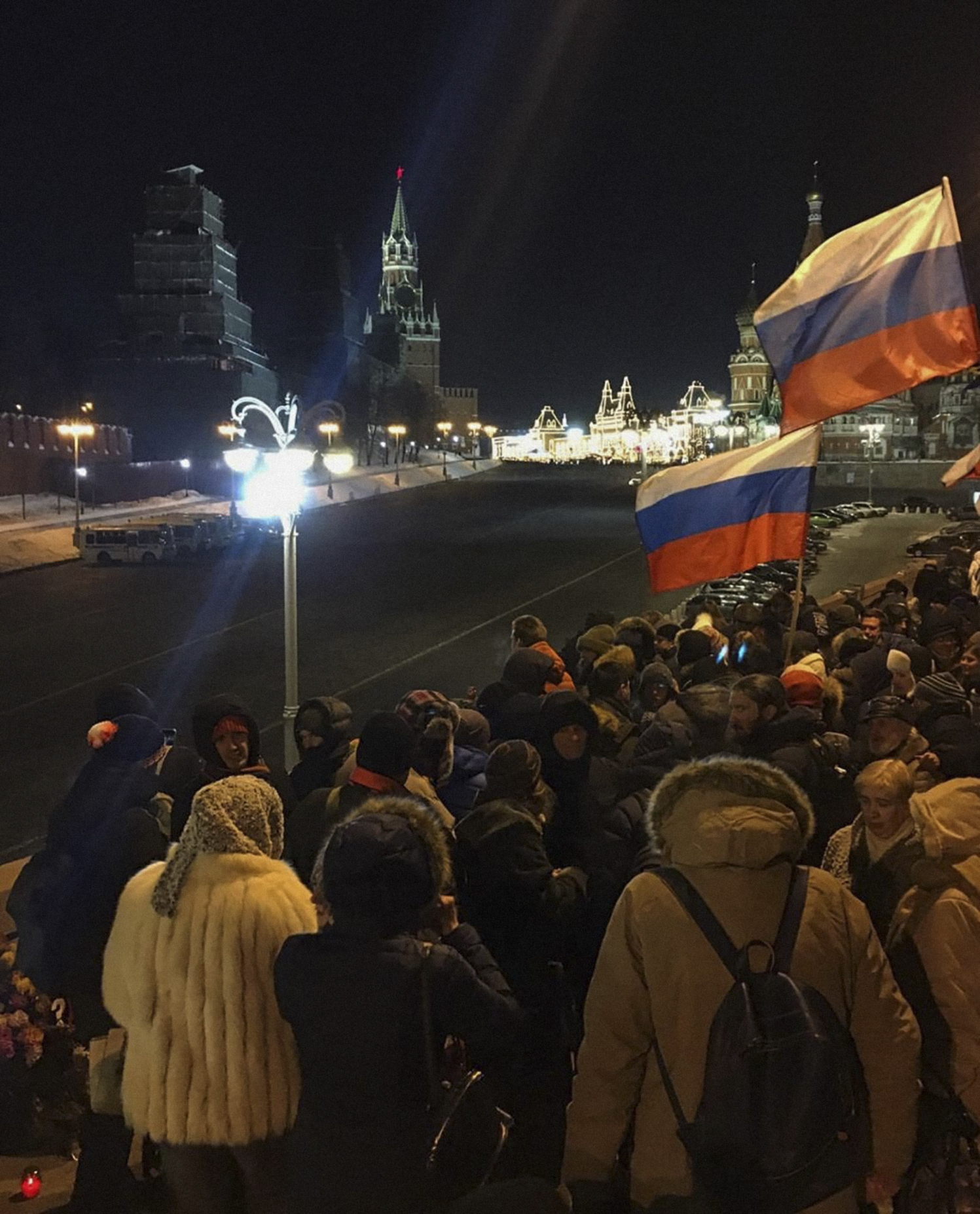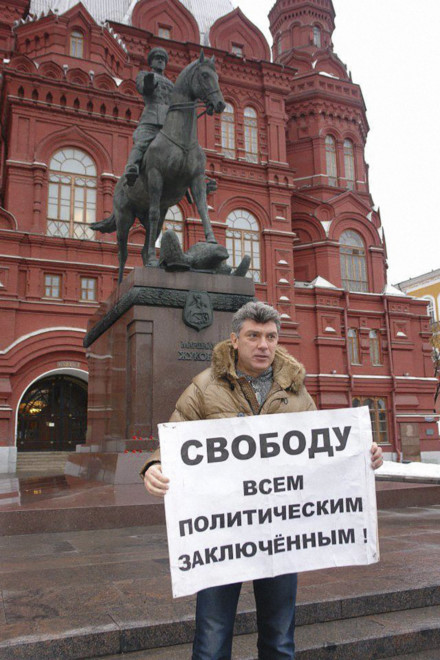27 February 2015
Moscow, Russia
Boris Nemtsov
Profession
Politics & Governance
Motive
Political dissent
Whistleblowing


Adolfo Olivas


Ahmed Divela


Amit Jethwa


Artan Cuku


Babita Deokaran


Bayo Ohu


Berta Cáceres


Bhupendra Veera


Bill Kayong


Boris Nemtsov


Boško Buha


Chai Boonthonglek


Charl Kinnear


Chut Wutty


Chynybek Aliev


Cihan Hayirsevener


Daphne Caruana Galizia


Darío Fernández


Derk Wiersum


Deyda Hydara


Édgar Quintero


Edmore Ndou


Edwin Dagua


Federico Del Prete


Fernando Villavicencio


Gezahegn Gebremeskel


Gilles Cistac


Habibur Mondal


Igor Alexandrov


Jacob Juma


Ján Kuciak


Javier Valdez


Joannah Stutchbury


José Ángel Flores


Jules Koum Koum


Kem Ley


Luis Marroquín


Mahamudo Amurane


Marcelo Rivera


María Elena Ferral Hernández


Marielle Franco


Milan Pantić


Milan Vukelić


Muhammad Khan


Nelson García


Nihal Perera


Oliver Ivanović


Orel Sambrano


Perween Rahman


Peter R. de Vries


Rajendra Singh


Salim Kancil


Sandeep Sharma


Sikhosiphi Radebe


Slaviša Krunić


Soe Moe Tun


Victor Mabunda


Virgil Săhleanu


Wayne Lotter


Yuniol Ramírez


Zezico Guajajara
27 February 2015
Moscow, Russia
Profession
Politics & Governance
Motive
Political dissent
Whistleblowing
It was nearing midnight on 27 February 2015, and the stars atop the Kremlin towers shone with their characteristic bright-red light. Boris Nemtsov and his partner, Anna Duritskaya, were walking along Bolshoy Moskovoretsky Bridge. It was a cold night, and the view from the bridge would have been breathtaking.
A snowplough passed slowly by the couple, obscuring the scene and probably muffling the sound of the gunshots fired from a side stairway to the bridge. The 55-year-old Nemtsov, a well-known Russian politician, anti-corruption activist and a fierce critic of Vladimir Putin, fell to the ground with four bullets in his back. Blurry video-camera footage, later released by the Russian government, captured in silence the screams of Duritskaya.
Nemtsov had become known in Russia in the 1990s when he was appointed as governor of Nizhny Novgorod Oblast by Boris Yeltsin. The country was mired in corruption after the collapse of the Soviet Union, and Nemtsov had used his position to begin fighting the problem. Hoping to eliminate fraud in the road-construction business in his region, he launched a new system in which construction companies would be paid only if they agreed to maintain the roads they built. As a result, it became unprofitable for contractors to cheat on their commitments.
Nemtsov became especially eager to expose the crimes committed by Putin, then prime minister, and his associates. In the early 2000s, when Nemtsov became one of the leaders of the Russian opposition, he devoted his life to the fight against corruption, embezzlement and fraud, claiming that the whole system built by Putin was akin to a mafia.
In 2009, he discovered that one of Putin’s allies, Mayor of Moscow City Yury Luzhkov, and his wife, Yelena Baturina, were engaged in fraudulent business practices. According to the results of his investigation, Baturina had become a billionaire with the help of her husband’s connections. Her real-estate development company, Inteco, had invested in the construction of dozens of housing complexes in Moscow. Other investors were keen to partner with Baturina because she was able to use her networks to secure permission from the Moscow government to build apartment buildings, which were the most problematic and expensive construction projects for developers.
Nemtsov’s report revealed the success of Baturina’s business empire to be related to the tax benefits she received directly from Moscow City government and from lucrative government tenders won by Inteco.
In a separate investigation, the results of which were released between 2008 and 2012, Nemtsov accused Putin of building an organized-crime syndicate, whose goal was to syphon money from the Russian budget and keep him in power for as long as possible. According to this investigation, Putin had accumulated great wealth as the president of Russia, becoming one of the richest people in the world. Nemtsov linked Putin to billionaire businessmen Gennady Timchenko, Yury Kovalchuk and Arkady and Boris Rotenburg, all revealed to be his close and long-time friends.
Nemtsov declared war against criminals in the Russian government and security forces by promoting the Magnitsky Act, which was adopted by the United States Congress in December 2012. The act, named after a Russian lawyer who was tortured and killed for exposing the corruption of high-level police officials, allowed the US to freeze the assets of any Russian authorities who were implicated in crimes in Russia; it is one of the harshest laws so far implemented by the US government against Putin’s regime. The act means that any person who has committed a crime in Russia, and avoided prosecution because of their loyalty to the regime, would be unable to spend their money in Western countries. A consequence of the act was the targeted persecution of the law’s supporters; after Nemtsov was murdered, one of the law’s other lobbyists, Nemtsov’s friend Vladimir Kara-Murza, was poisoned.

A mourning vigil held at the assassination site shortly after Boris Nemtsov's murder

Nemtsov leading a protest, prior to his murder
Through his investigations, Nemtsov proved how fraud and other criminal practices pervaded Putin’s Russia at almost every level. In 2013, he was elected as a Member of Parliament, which gave him access to information on the budget. He discovered blatant violations of the law taking place in public procurement processes.
His suspicion that Putin had abused his authority by sending soldiers into Crimea in 2014, led him to launch an investigation into Putin’s illegal interference in Ukraine. After the annexation of Crimea, private contractors from Russia invaded the south-east region of Ukraine, supposedly accompanied by factions of the Russian army.
A few weeks before his murder, Nemtsov had said that he was going to work on a new report about the Russian invasion of Ukraine’s Donbass region. He wanted to link the deaths of thousands of people – including passengers of the Malaysia Airlines plane shot down by a Russian-made missile in 2014 – to members of the Russian government and hold them accountable for crimes against humanity. As a first step, he had planned to meet with the relatives of soldiers who had fought in Ukraine.
As Nemtsov gathered evidence against Putin and his associates, he became an ever greater threat to the regime. Not only had he courageously demanded the prosecution of several Russian elites but he was able to back up his claims as a result of his committed research, the facts of which were irrefutable.
A few days before the murder, in an interview with Russian media, Nemtsov had said that he was afraid of Putin, who may attempt to plan his murder. He had also previously revealed that Ramzan Kadyrov, head of the Chechen Republic, had once threatened to murder him. Significantly, when Nemtsov’s killers were eventually identified, they were revealed to be Chechens with close connections to Kadyrov. In July 2017, Zaur Dadaev and four accomplices were sentenced to stays of between 11 and 20 years in prison for Nemtsov’s murder. Ilya Yashin, a friend of Nemtsov’s, accused Kadyrov of having commissioned the assassination, for which the hitmen were allegedly paid 15 million rubles.
Although it cannot be said for certain that Putin was aware of the plot to murder Nemtsov, according to Vladimir Milov, a former deputy minister of energy, ‘There is ever less doubt that the [Russian] state is behind the murder’. Four years later, the Kremlin is blocking any scrutiny of the investigation, and the trail of the mastermind behind the crime is growing colder.
July 2023 update
In August 2015, Nemtsov’s daughter, Zhanna Nemtsova, filed a complaint against Russia with the European Court of Human Rights under Article 34 of the European Convention on Human Rights. Her complaint was based on the failure of the Russian authorities to conduct an effective domestic investigation into the murder. On 11 July 2023, the Court ruled that the Russian authorities were under an obligation to investigate who had ordered and organized the murder. The Court concluded that by failing to clarify these aspects of the crime, the Russian authorities’ investigation into Nemtsov’s death had been ‘inadequate’ and ‘ineffective’.


8 April 2017
Tirana, Albania
Artan Cuku


10 June 2002
Belgrade, Serbia
Boško Buha


19 December 2009
Bandirma, Turkey
Cihan Hayirsevener


16 October 2017
Bidnija, Malta
Daphne Caruana Galizia


18 September 2019
Amsterdam, Netherlands
Derk Wiersum


18 February 2002
Casal di Principe, Italy
Federico Del Prete


1 July 2001
Slavyansk, Ukraine
Igor Alexandrov


21 February 2018
Veľká Mača, Slovakia
Ján Kuciak


11 June 2001
Jagodina, Serbia
Milan Pantić


6 November 2007
Banja Luka, Bosnia and Herzegovina
Milan Vukelić


16 January 2018
North Mitrovica, Kosovo
Oliver Ivanović


15 July 2021
Amsterdam, The Netherlands
Peter R. de Vries


22 April 2019
Banja Luka, Bosnia and Herzegovina
Slaviša Krunić


7 September 2000
Iași, Romania
Virgil Săhleanu